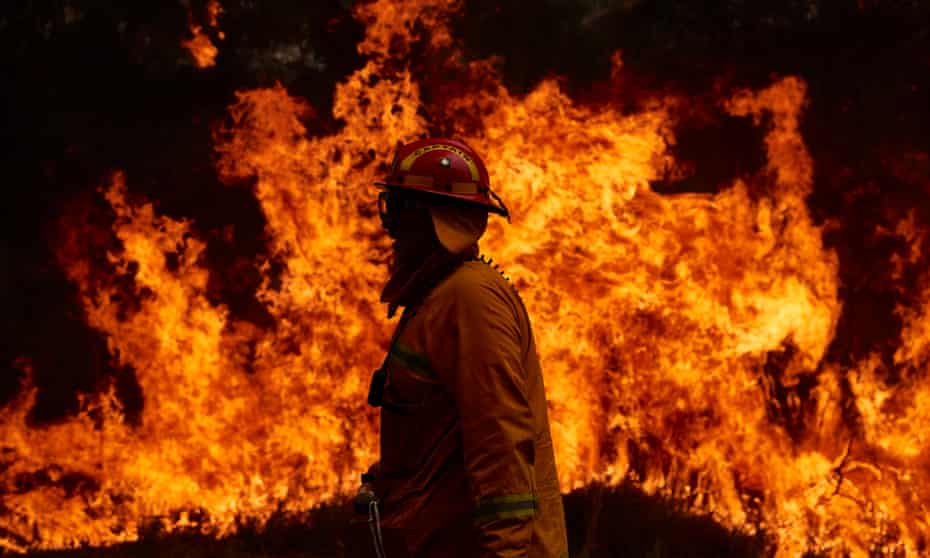Extract from The Guardian
If we are to reverse the destruction of our planet, it will take more than ‘heroic’ words from ministers in Canberra.

‘It is hard to keep the faith when the reality of the climate crisis is seared into us by events such as the cataclysmic bushfires last year.’ Firefighter in Sydney.
Last modified on Fri 29 Oct 2021 00.34 AEDT
Countries and corporations have been falling over each other to claim they are doing more than any other in the world to stop climate breakdown.
Now Australia has added to the throngs of climate pledges. One of the world’s biggest coal exporters grandly announced an aim to reach net zero by 2050 and said it was doing more than others to address the climate crisis.
Unfortunately, rather than land on its feet, it has ended up in a messy scrum of Trump-style boasting and empty promises. Sheltered within the comforting and technocratic term of “net zero” is the horrifying potential of the status quo.
Miraculously, Australia says it will achieve its climate targets without ending any of its fossil fuel production or exports. It will rely instead on 40% of emissions cuts from a technology investment roadmap, “global technology trends” for 15%, domestic and international offsets for 10-20%, and “unknown future technology” for a further 15%. It’s a zany prospectus.
The bare-faced commitment to both fossil fuels and net zero would be laughable if not for the earth-shattering climate impacts that continued production of fossil fuels are causing. Australia’s announcement perfectly illustrates how easy it is to use a “net zero” pledge to greenwash climate inaction – and, of course, it will take more than just rhetoric to reverse the damage wrought on people and planet over the past century.
This futuristic shopping list of emissions reductions is also strung along a timescale vastly inadequate to counter the speed and scale of global heating. One of the true litmus tests for a net zero target is whether there is a strong interim ambition for emissions reductions before 2050. In Australia’s case, the government has refused to strengthen its 2030 commitment ahead of Cop26 – it’s promised a cut in emissions by then of only 26%-28% compared with 2005 levels.
This is vital in light of a new report from the UN which warns current pledges from nations, made in nationally determined contributions, cut a mere 7.5% of emissions by 2030 compared to prior commitments. However, to limit global temperature rises to 1.5C, it is estimated that emissions must be slashed by around 55% by then. In this context, the promises of Australia’s conservative government seem feeble, to say the least. What is needed is commitment to real zero, not net zero. That means getting emissions down to nearly zero, without relying on carbon offsets or carbon capture fixes – both unproven technology at scale. This requires hard graft to decarbonise now, not in decades, and is a target not reliant on offsets and technological fixes.
Unfortunately for those countries and companies that do hope to mop up business-as-usual emissions with offsets such as tree planting, there is simply not enough land in the world. Carbon offsetting is known to be deeply unreliable and tantamount to greenwashing. Take oil corporations such as Royal Dutch Shell: its plan for “net zero by 2050” includes offsetting emissions over the next decade that would require land three times the size of the Netherlands. Nature restoration is certainly critical to avoid ecological collapse and improve human wellbeing, but it should not be used as shorthand for “pollute now, abate later”.
This is particularly crucial as offsets often refer to tree plantations or similar projects in the global south, which could lead to land grabs, displacement and food insecurity. It is unjust for those least responsible for global heating, whose own emissions are often negligible, to be used to offset the emissions of global north countries that refuse to take seriously the transition away from fossil fuels.
The global reception of net zero strategies like Australia’s should also be cause for concern, particularly ahead of Cop26. Boris Johnson called Australia’s commitment a “heroic thing”. Heroic indeed, but only in an Odyssean sort of way, with a net zero Trojan horse containing fossil fuel expansion inside. Other nations should call out, rather than celebrate, empty net zero promises, if Cop26 is to be more than a pageant of fine speech.
The boastful language of “climate leadership” is rhetoric that must be confined to the past, along with any cooking of the carbon accounting books. No one can believe that Australia is doing more than other countries when its coal industry and intentions for fossil fuels are in plain sight for all to see, as well as being baked into its net zero strategy.
There’s potency in climate futurism – the belief that breakdown is on the horizon rather than unfolding all around us. But it is hard to keep the faith when the reality of the climate crisis is seared into lived experience by events such as the cataclysmic bushfires across Australia last year, and countless climate impacts around the globe. If we are to reverse the destruction of our planet, it will take more than words.
Eleanor Salter is a writer and climate campaigner
No comments:
Post a Comment